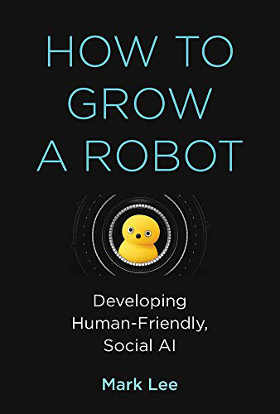| How to Grow a Robot: Developing Human-Friendly, Social AI |
|
Author: Mark H. Lee This book sets out to look at how robots can be more human-like, friendly and engaging. This sounds worryingly fluffy, but Mark Lee is an engineer who has worked on iCub, a humanoid robot that developed from newborn helplessness to the ability levels of a nine-month old child. The thinking behind this book is to ask "what's wrong with artificial intelligence", and to look at whether developmental robots could learn empathy.
The book opens with a section asking what's wrong with AI. Having described the nature of the problem and looked at existing commercially available robots and those currently being researched, Lee moves on to look at systems such as the chess playing Big Blue before examining the difference between power-based systems and knowledge-based systems. This part of the book ends with a look at neural networks and related work, and how all the techniques described so far can be combined.
Part Two of the book is titled 'robots that grow and develop, with interesting chapters on cybernetics, growing your own robot using ontogeny, and the work Lee was involved with on iCub, The final part of the book asks where we go from here. Lee hypothesizes how developmental robots will develop in terms of self awareness, consciousness and communication, then looks at how AI and AI-robots are developing. This includes ideas such as human-level AI, and artificial human intelligence. There's an interesting chapter on how to understand future technology with sections on deep networks and autonomous learning; trust, validation and safety, and ethics. The book closes with a chapter on futurology and science fiction that provides a thought provoking end. I enjoyed reading this book. It made me think as well as giving a clear framework on where robotics are now. I don't think developers working in robotics would learn a great deal from the book, but If you're interested in robotics more casually, either as an area for work or just as something we all come into contact with, I can recommend it.
To be informed about new articles on I Programmer, sign up for our weekly newsletter, subscribe to the RSS feed and follow us on Facebook or Linkedin.
|
|||
| Last Updated ( Tuesday, 12 January 2021 ) |

